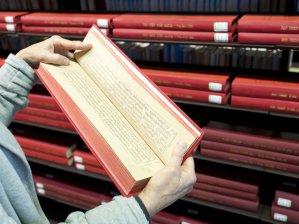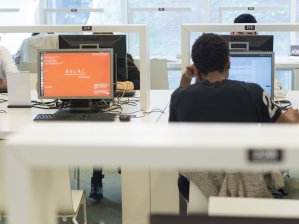Who are we?
BULAC's primary mission is to create relevant and robust collections of books and documents, mainly in vernacular languages, on the languages and civilisations of the Balkans, Central and Eastern Europe, the Maghreb, the Near East, the Middle East, Central Asia, Africa, Asia, the South Sea Islands and native American civilizations. Linguistics, literature, history and other fields in the humanities and social sciences are among the vast disciplinary fields BULAC covers to promote understanding of these cultural spaces.
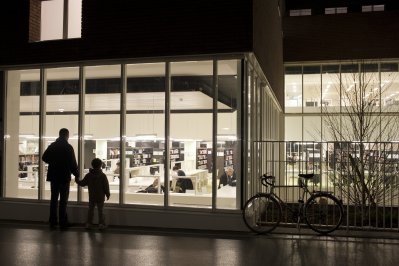
La BULAC vue de la rue des Grands Moulins, de nuit (Grégoire Maisonneuve / BULAC).
A study and research library
At BULAC the concept of “languages and civilisations” covers vast disciplinary fields in the humanities and social sciences, literature and arts of all the countries concerned.
The BULAC's collections bring together the holdings of around twenty libraries and collections specialising in languages and civilisations to give a total of 1.5 million works. A particular feature of these collections is that nearly half of the original holdings were constituted by internationally-renowned researchers. The documents currently in our collections come in all formats—print (books and journals in all languages), printed sheets, photographs and audiovisual material or digital files.
The BULAC's collections thus respond to users' need to understand the way the world's civilisations are evolving on geopolitical, environmental, religious or cultural levels. BULAC aims to ensure that the documents in its field are both preserved on a long-term basis and always up-to-date to thus create an international-level research centre with high-level collections and promote interdisciplinarity and a comprehensive approach to phenomena. Another aim is to make this tool available to diverse sectors of society such as students, teachers, researchers, decision-makers as well as the non-academic public and in this respect BULAC is unique among its kind.
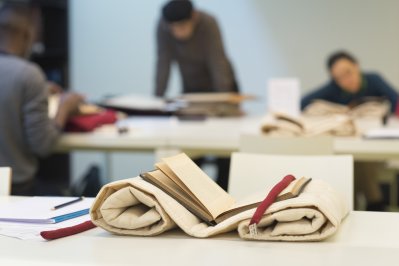
Salle de la réserve (Grégoire Maisonneuve / BULAC, 2016)
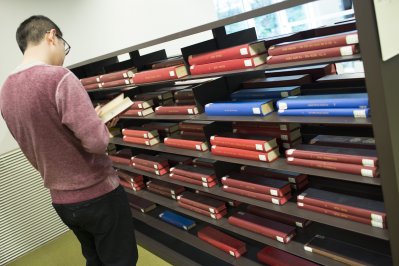
Le fonds tibétain en libre accès au rez-de-jardin de la BULAC (Grégoire Maisonneuve / BULAC).
Discover our paper and digital collections
Location
Located at the heart of the “Pôle des Langues et Civilisations” (Languages and Civilisations Centre), next to the Institut national des langues et civilisations orientales (Inalco) [French National Institute of Oriental Languages and Civilizations], BULAC's vocation is to provide a space help bring people together and for creation, reference and memory. The library aims to develop a synergy between the research and librarian professions throughout the successive stages of scientific creation—the production and processing of corpora and conserving and communicating documents. As this kind of ambition in the field of documentation involves such vast territories, it only makes sense in the broader framework of a partnership with other institutions which makes up a robust documentation network with accurate mapping of document resources in each field.
- Metro: line 14, stop at “Bibliothèque François-Mitterrand”.
- RER C: stop at “Bibliothèque François-Mitterrand”.
- Buses: 27, 62, 89, 132, 325, N131.
- Tramway: T3, get off at “Avenue de France”.
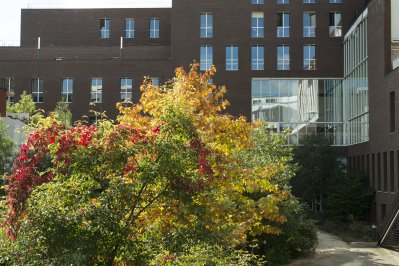
La BULAC en automne (Grégoire Maisonneuve / BULAC)
The library premises and opening hours
BULAC mainly serves students, researchers and teachers but it is also open to other members of the public with an interest in our specialist collections... as long as they register. BULAC is on three floors:
- The ground floor is mainly for students and contains basic and more general documents.
- The garden level is for more advanced students, teachers and researchers. It contains more specialized and in-depth documents books and journals up to research level.
- The Reserve section is also on this floor.
The mezzanine hosts workstations for audiovisual documents and self-training in languages along with an international “Kiosque” area devoted to the news with print journals, digital resources and world news databases. The library hosts 910 work places with electric mains supply and Internet links, language self-training workstations, an audiovisual space and work rooms.
Please note that BULAC does not have a wifi connection so we advise you to bring your own Ethernet cable although cables can be lent out from the ground floor reception desk as long as stocks are available.
The documentary sector of the “Pôle des langues et civilisations”
The “Pôle des langues et civilisations” (Languages and Civilisations Centre) opened in October 2011, providing new facilities in the new Latin Quarter of Paris - the “ZAC Paris-Left-Bank”—alongside the Bibliothèque nationale de France François Mitterrand (BnF) [François Mitterrand National Library of France]. This centre has no equivalents elsewhere in the world, bringing together as it does the majority of resources and participants from the field of diversity of world languages and cultures. The “Pôle des langues et civilisations” is not autonomous on an administrative level and is made up of several organizations with converging interests, objectives and missions in the same group of buildings:
- The Institut national des langues et civilisations orientales (Inalco), [French National Institute of Oriental Languages and Civilizations] for teaching,
- BULAC (University Library for Languages and Civilisations) for documentation,
- a new development planned for 2017 which will house research teams, researchers, teacher-researchers and doctoral studies in the project's partners' research programmes and laboratories.
The “Pôle des Langues et Civilisations” also has an 200-seat auditorium which regularly houses cultural and scientific events organized by Inalco, BULAC and their partners. The auditorium can be reserved for use by public or private sector organizations.
Education and Research Coordination
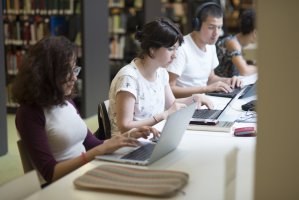
Des lecteurs à la BULAC (Grégoire Maisonneuve / BULAC, 2018)
BULAC's Education and Research Coordination Mission was set up to galvanize exchanges between the library and the world of research into the geolinguistic sectors covered by BULAC.
There are multiples objectives to this namely:
- promoting interaction between researchers and librarians
- promoting the library's collections
- getting researchers involved in the life of the library
- organizing documentary mediation aimed at researchers
- integrating BULAC into research networks
This Mission works on behalf of varied sections of the public including teachers, researchers, doctoral and post-doctoral students working on world cultural, political and economic diversity. Specific services are provided for these users for example personalized assistance for researchers from other countries. The Education and Research Coordination (Coordination Enseignement et Recherche) mission is the designated contact for teachers and researchers to ensure constant coordination on priority acquisitions.
Events and meetings at BULAC
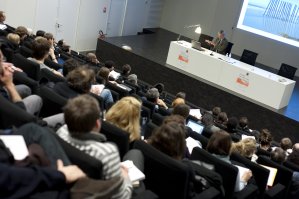
Conférence inaugurale du Cycle « À quoi servent les frontières ? », par Michel Foucher, janvier 2012 (Grégoire Maisonneuve / BULAC).
Part of BULAC's mission involves organizing cultural events with the aim being to provide alternative ways for people to discover all the singularity and wealth of BULAC's heritage collections and thus enrich their personal or professional culture.
BULAC's cultural events draw on all the forms, sources and formats of knowledge and include the monthly "Mardis de la BULAC" (BULAC's Tuesdays) conferences, book-centred events, film screenings and exhibitions. These events promote the remarkable, specialist collections of the library, particularly our holdings in vernacular languages which help make the library so original, and also facilitate exchanges between different knowledge fields thus promoting transdisciplinarity and the transmission of knowledge.
Scientific Committee
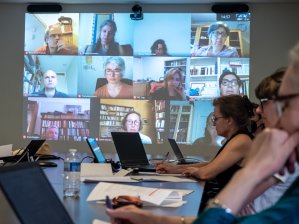
Conseil scientifique de la BULAC - séance hybride du 10 juin 2021
The Scientific Committee’s mission is to suggest the scientific orientations of the library (documentary policy, user services etc.) and to give the Board of Governors views and recommendations on the Group’s activity programme. Its particular responsibility is to supervise the relation between research and documentary policy. The Scientific Committee, under the chairmanship of Éloi Ficquet, is composed of the following:
- Mr. Olivier de Bernon
Research advisor (EFEO) - Ms. Françoise ’Nalini’ Delvoye
Research advisor (EPHE) - Ms. Sylvie Denoix
Research advisor (CNRS) - Mr. Éloi Ficquet
Assistant Professor (EHESS) - Mr. Emmanuel Francis
Researcher (CNRS) - Mr. Marc Gilbert
Librarian (Leiden University, Netherlands) - Ms. Irina Gridan
Assistant Professor (INALCO) - Ms. Marie-Paule Hille
Assistant Professor (EHESS) - Ms.Annick Horiuchi
University Professor (Université de Paris) - Ms. Françoise Hours
Librarian (Bibliothèque nationale de France) - Mr. Zhe Ji
University Professor (INALCO) - Ms. MariaLuisa Langella
Librarian (St. Antony’s College, Oxford University, Great Britain) - Ms. Camille Lefebvre
Researcher (CNRS) - Mr. Alain Messaoudi
Assistant Professor (Université de Nantes) - Ms. Meliné Pehlivanian
Librarian (Staatsbibliothek zu Berlin, Germany) - Mr. Philippe Peycam
International Institute of Asian Studies Director (Leiden University, Netherlands) - Mme Pollet Samvelian
University Professor (Sorbonne-Nouvelle) - Ms. Silvia Serrano
University Professor (Sorbonne Université) - Mr. Peter Stockinger
University Professor (INALCO) - Mr. Nicolas Vatin
Research advisor (CNRS) (EPHE)
